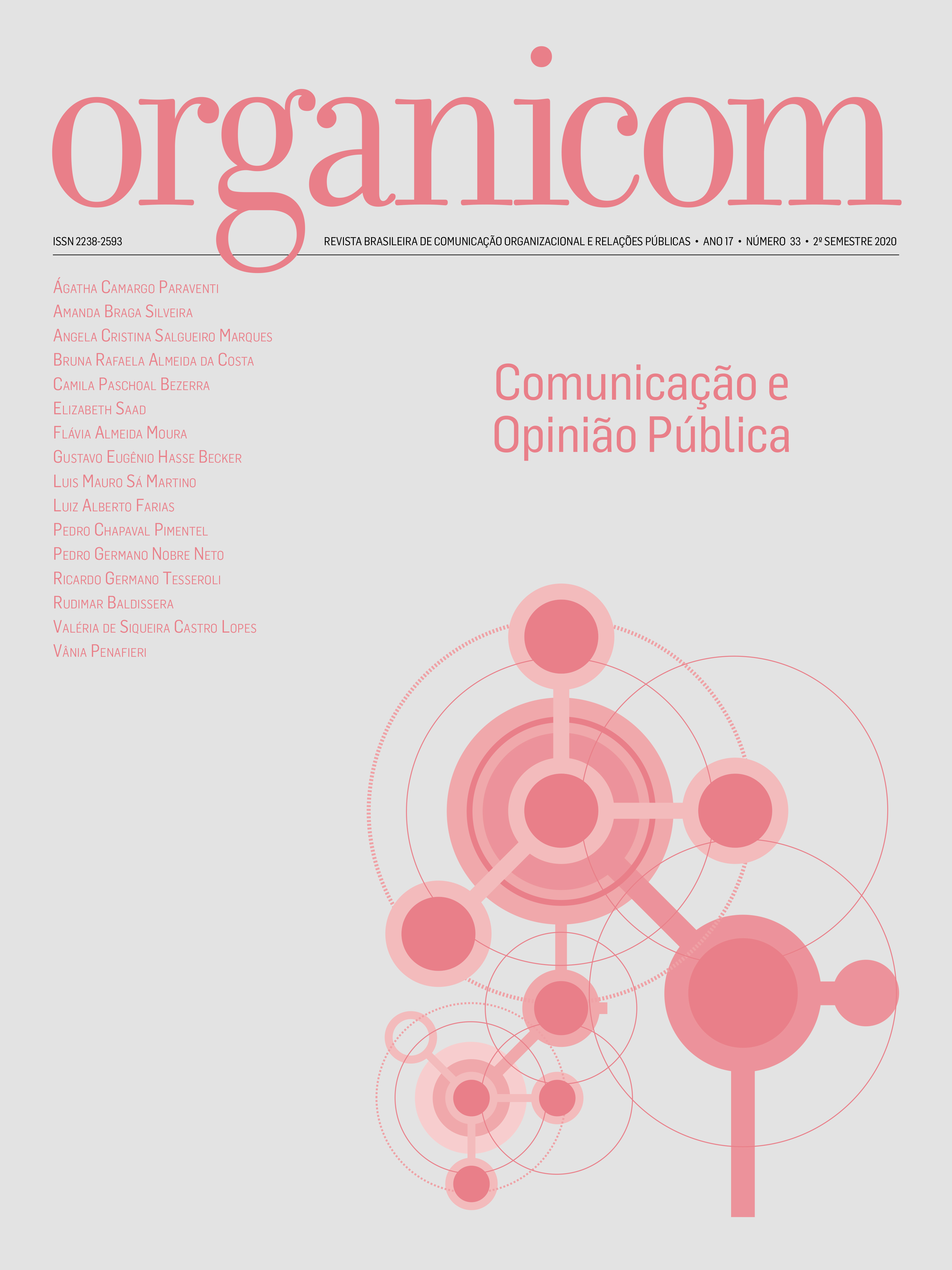The use of new social media in public opinion research
DOI:
https://doi.org/10.11606/issn.2238-2593.organicom.2020.173726Keywords:
Public opinion, Social media, Research methods, SamplingAbstract
Our study discusses the relationship between social media and public opinion studies based on a selective literature review. It presents a series of methods used internationally to measure public opinion in social media on various topics, discussing their advantages and limitations, and the different conclusions that these methods allow. By focusing on the unit of analysis and the limitations of population inference of these new media, our article offers an opportunity for an academic discussion involving both data collected via population samples of individuals and population samples of information that influence the opinion of these individuals.
Downloads
References
BATISTA, Leandro Leonardo; PEREZ, Clotilde. Novos meios e novos métodos de pesquisa: desafios, soluções e avanços. Organicom, São Paulo, v. 13, n. 25, p. 69-78, 2016.
BLANK, Grant; LUTZ, Christoph. Representativeness of social media in Great Britain: investigating Facebook, Linkedin, Twitter, Pinterest, Google+, and Instagram. American Behavioral Scientist, Thousand Oaks, v. 61, n. 7, p. 741-756, 2017.
DUGGAN, Maeve et al. Social media update 2014. Pew Research Center, Washington, DC, v. 19, p. 1-2, 2015.
GONG, Zhaoya et al. Measuring relative opinion from location-based social media: A case study of the 2016 US presidential election. Plos one, Beijing, v. 15, n. 5, e0233660, 2020.
GUIDRY, Jeanine PD; AUSTIN, Lucinda; MEYER, Michele. #Gunviolence on instagram and twitter: examining social media in the wake of the parkland school shooting. Journals of Public Interest Communications, Gainesville, v. 4, n. 1, p. 4-36, 2020.
HARGITTAI, Eszter. Potential biases in big data: omitted voices on social media. Social Science Computer Review, Thousand Oaks, v. 38, n. 1, p. 10-24, 2020.
HARGITTAI, Eszter. Whose space? Differences among users and non-users of social network sites. Journal of Computer-Mediated Communication, Hoboken, v. 13, n. 1, p. 276-297, 2007.
JIANG, Xiaoya et al. Characterizing media content and effects of organ donation on a social media platform: content analysis. Journal of Medical Internet Research, Toronto, v. 21, n. 3, e13058, 2019
LOPEZ-LOPEZ, Paulo Carlos; ONATE, Pablo; ROCHA, Alvaro. Social media mining, debate and feelings: digital public opinion’s reaction in five presidential elections in Latin America. Cluster Computing, New York, p. 1-12, 2020.
MAZER, Joseph P.; THOMPSON, Blair; CHERRY, Jessica; RUSSELL, Mattie; PAYNE, Holly J.; KIRBY, E. Gail; PFOHL, William. Communication in the face of a school crisis: examining the volume and content of social media mentions during active shooter incidents. Computers in Human Behavior, Amsterdam, v. 53, p. 238-248, 2015.
MURPHY, Joe et al. Social media in public opinion research: executive summary of the aapor task force on emerging technologies in public opinion research. Public Opinion Quarterly, Oxford, v. 78, n. 4, p. 788-794, 2014.
NEUBAUM, German; KRÄMER, Nicole C. Monitoring the opinion of the crowd: psychological mechanisms underlying public opinion perceptions on social media. Media Psychology, Abingdon, v. 20, n. 3, p. 502-531, 2017.
NG, Yu Jie; YANG, Janet; VISHWANATH, Arun. To fear or not to fear? Applying the social amplification of risk framework on two environmental health risks in Singapore. Journal of Risk Research, Abingdon, v. 21, n. 12, p. 1487-1501, 2018.
OZAWA, João Vicente Seno e BATISTA, Leandro Leonardo. A análise de redes sociais como uma proposta metodológica para estudos da teoria da agenda-setting. In: SEMINÁRIO INTERNACIONAL DE PESQUISAS EM MIDIATIZAÇÃO E PROCESSOS SOCIAIS, 3., 2019, São Leopoldo. Anais […]. São Leopoldo: Unisinos, 2019. p. 1-15.
SELTZER, Emily et al. Public sentiment and discourse about Zika virus on Instagram. Public Health, Bethesda, v. 150, p. 170-175, 2017.
TEICHMANN, Lisa et al. Public health communication and engagement on social media during the Covid-19 pandemic. Osf.io, 2020. doi: 10.31219/osf.io/7hypj.
VIEIRA, Aiane de O.; SELEGHIM, Ariane D. Populismo, governabilidade e opinião pública: uma análise da influência das mídias digitais no processo decisório presidencial. Agenda Política, São Carlos, v. 8, n. 2, p. 163-186, 2020.
Downloads
Published
Issue
Section
License
Copyright (c) 2020 Leandro Leonardo Batista

This work is licensed under a Creative Commons Attribution-NonCommercial-ShareAlike 4.0 International License.
A submissão implica a cessão de direitos da primeira publicação à revista Organicom, sem pagamento. Os autores podem estabelecer por separado acordos adicionais para a distribuição não exclusiva de versão da obra publicada na revista (como colocar em um repositório institucional ou publicar um livro), com o devido reconhecimento de sua publicação inicial na revista Organicom.


